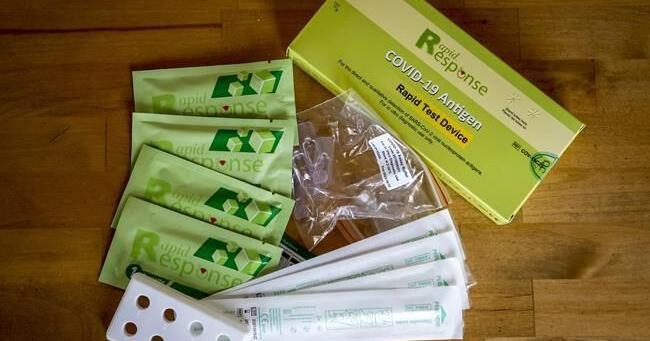The distribution of COVID-19 test kits through Kelowna schools has been paused based on an advisory from Health Canada that the kits should be kept out of the reach of children.
While Health Canada says the kits are safe and effective when used as intended, it cautions they contain chemical preservatives that “may be poisonous if swallowed or absorbed through the skin, particularly in children and pets”.
“Health Canada is aware of approximately 50 calls made to poison control centres in Canada related to accidental exposure, which have resulted in minor health outcomes,” states part of the advisory, issued Thursday.
The advisor further states: “Keep rapid antigen test kits and solutions out of the reach of children and pets”.
Based on the advisory, Central Okanagan Public Schools has paused plans to send the kits, each of which contains five test strips, home in the backpacks of the district’s 22,500 students.
“Out of an abundance of caution, the district is delaying the distribution of the rapid antigen tests and is awaiting further direction from the Ministry of Education,” school superintendent Kevin Kaardal said in an email Friday.
“After receiving further direction, the district will review its communications and distribution directions for elementary school students,” he says. “Tests are safe to use and should be stored safely and used under parent supervision.”
Some of the test kits have already been distributed to Central Okanagan students. In an email to parents sent Friday afternoon, Kaardal advised those tests “should be stored securely and used as directed under parental supervision”.
The Daily Courier asked the Ministry of Health early Friday afternoon for a response.
At 6:50 p.m., they responded:
“Test kits made available through B.C. schools are approved by Health Canada. We had no advance notice that Health Canada had concerns about the potential misuse of the package contents. The kits remain safe and effective if used as directed.
“Now that Health Canada has expressed concerns about the potential misuse, we are acting. It is recommended that any remaining distribution of Rapid Antigen Tests for Grades K-7 be direct to parent/guardians.
These kits are safe and effective for self-testing at home – be sure to read the package instructions carefully. As with many medications and at-home care products, please note the following:
– These kits are intended to be handled and administered by adults
– Do not swallow the solutions, and avoid eye and skin contact
– Wash hands thoroughly after use
– Please keep the test components out of reach of small children and animals
– Used tests and components can be disposed of in household garbage
Below is a story that appeared earlier this week concerning the planned distribution of the test kits through schools:
Five COVID-19 rapid tests will be sent home with every student enrolled in Kelowna-area schools unless parents say by this Friday they don’t want to receive the kits.
“The contents of these tests are completely safe, and our plan is to give test kits to students to bring home in their backpacks,” reads part of an email sent Tuesday evening by Central Okanagan Public Schools’ officials to Kelowna-area parents.
Parents who don’t want to receive the rapid antigen test kits must indicate their opposition before Friday. The email response form does not require people to give a reason why they don’t want the tests.
Health Minister Adrian Dix said last week schools will receive 3.8 million kits for distribution among K-12 students, plus another 2.1 million for colleges and universities.
“These allocations related to education mark an important shift, as students will be offered in the coming weeks the opportunity to take home one five-test kit for their and their family’s future use, if they were to become symptomatic,” Dix said.
Only people who show signs of COVID-19 should use the tests, he said.
“That hasn’t changed. Increased test availability means that more members of the general population will be able to access tests to use to understand their own symptoms and illness, and to take action to limit transmission to their friends, family and work,” Dix said.
Across B.C., 48% of children age five to 11 have been vaccinated against COVID-19, the B.C. Centre for Disease Control says. Among children age 12 to 17, the vaccination rate is 87% for one dose, and 83% for two doses.
The comparable vaccination rates for most areas of the Central Okanagan are slightly below the provincial average.
For example, the one-shot vaccination rate for children five to 11 is 35% in the Central Okanagan’s rural regions, and it’s 40% in Rutland, and 41% in Lake Country. The rate is highest in Okanagan Mission, at 60%.


